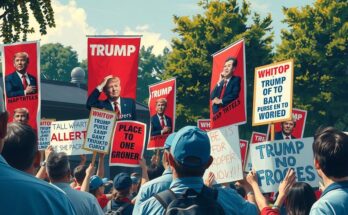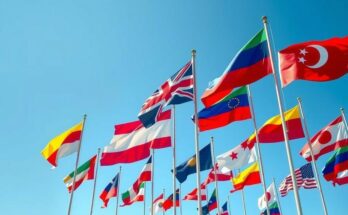Juan Pablo Guanipa, prominent Venezuelan opposition leader, was arrested on conspiracy charges just days before contentious elections, prompting accusations of repression from opposition figures and international officials. The situation reflects escalating tensions and the broader crisis in Venezuela’s political landscape, with allegations of foreign plots complicating the environment further.
On Friday, Venezuelan opposition leader Juan Pablo Guanipa was arrested ahead of a highly contentious election scheduled for this Sunday. Guanipa, a 60-year-old former member of parliament, was taken into custody on conspiracy charges related to an alleged plan to sabotage upcoming parliamentary and regional elections. This situation unfolds within an environment of heightened tensions, as the opposition, led by Maria Corina Machado, has called for a boycott of the upcoming vote, asserting that it is flawed.
Guanipa, closely associated with Machado, had gone into hiding following the controversial July 2024 presidential election. Many believe that the opposition candidate, Edmundo Gonzalez Urrutia, was the rightful victor, a sentiment that is shared by much of the international community. Meanwhile, Interior Minister Diosdado Cabello has publicly linked Guanipa’s arrest to a purported foiled conspiracy involving foreign mercenaries aiming to disrupt the electoral process. The Venezuelan government claims to have uncovered detailed plans for attacks in various public locations from devices seized during the arrest.
According to Cabello, the authorities found explosives, weapons, detonators, and cash during the search of Guanipa’s premises. In total, approximately 70 individuals were detained in relation to this alleged scheme, including nationals from several countries. This sweeping action against opposition figures has drawn condemnation from figures like U.S. Secretary of State Marco Rubio, who characterized Guanipa’s arrest and the detention of others as indicative of growing repression under Maduro’s government. Rubio described it as a “new wave of repression from the Maduro regime.”
Following his arrest, a post from Guanipa’s X account stated, “If you are reading this, it is because I have been kidnapped by the forces of Nicolas Maduro’s regime.” The message conveyed deep uncertainty about his future but also a resolute faith in eventual victory against the regime. Machado fiercely criticized Maduro’s actions, labeling them as “STATE TERRORISM, pure and simple,” and hailed Guanipa as a symbol of resilience for Venezuelans.
Maduro has faced ongoing challenges during his twelve years in power, particularly regarding the country’s once-thriving oil economy, which has seen a catastrophic decline, prompting mass emigration. In the backdrop of these troubles, he claimed victory in the previous elections without presenting concrete evidence, while the opposition published a contrasting tally pointing to Gonzalez Urrutia’s significant lead.
On the day of Guanipa’s arrest, the state prosecutor accused him of belonging to a so-called “criminal organization” that attempted to compromise the integrity of both the July election and the upcoming vote. Maduro, often highlighting alleged threats to his regime from the U.S. and Colombian forces, has increasingly resorted to mass arrests of dissenters. The government is also taking steps to suspend flights from Colombia amidst concerns about suspected mercenaries infiltrating the country.
The arrest of Juan Pablo Guanipa highlights rising political tensions in Venezuela as elections approach, with the opposition rejecting the legitimacy of the vote. Guanipa’s detention, linked to conspiracy allegations, has drawn international criticism amid charges of repression by the Maduro regime. The unfolding events are symptomatic of a broader struggle against authority and calls for change within a tumultuous political landscape.
Original Source: www.france24.com




